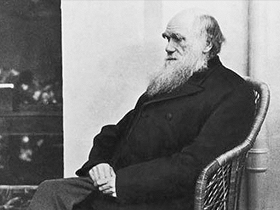 The first person to propose the theory of evolution in the form it’s accepted today was Charles Robert Darwin, an amateur British naturalist.
The first person to propose the theory of evolution in the form it’s accepted today was Charles Robert Darwin, an amateur British naturalist.
Darwin never received any genuine training in biology and possessed only an amateur knowledge of nature and living things. As a result of his interest he took his place as a volunteer on the discovery vessel HMS Beagle, which sailed from Britain in 1832 and traveled through various regions of the world over the next five years.
Darwin was highly influenced by the different species he saw during the course of this voyage, and especially by the different species of finches he observed on the Galapagos Islands. He concluded that the differences in these birds’ beaks stemmed from their adaptation to their surroundings. As a consequence of this idea, he assumed that the concept of environmental adaptation lay at the heart of all the variety among living things.
Yet in making that assumption, Darwin ignored the scientific facts, opposed the evidence that God created all living species, and suggested that living things were all descended from some common ancestor and became differentiated from another due over time, due to environmental conditions.
This hypothesis of Darwin’s was based on no scientific facts or experiments. However, with the support and encouragement that he received from eminent materialist biologists of the time, Darwin gradually worked up these hypotheses into a coherent theory, according to which all living things were descended from a single primitive ancestor, but had been subjected to minute changes over very lengthy periods of time, and thus diverged anatomically from one another.
The ones that best adapted to their surroundings passed their characteristics on to subsequent generations, and these beneficial changes thus accumulated in such a way as to turn these individuals’ offspring into life forms that were very different from their forerunner. (How these beneficial changes came about unclear, however.) According to Darwin, human beings were the most advanced product of this hypothetical mechanism.
Darwin called this product of his own imagination “evolution by way of natural selection.” He now imagined that he had discovered the origin of species. The origin of any one species was another, less developed species. He eventually announced these ideas in his book The Origin of Species, published in 1859.
Darwin constructed his theory on the concept of natural selection, which meant the survival of the strongest individuals or those best able to adapt to environmental conditions in the struggle for survival in their environment. That is the claim emphasized in the subtitle of Darwin’s book: The Origin of Species: By Means of Natural Selection.
There are natural and random differences within any living species. Some cattle are larger than others, for example, and others are darker in color. Those characteristics that are most advantageous will be favored through natural selection, and the beneficial characteristic in question will thus come to predominate in that animal population. Through an accumulation of these features over a long period of time, a new species will emerge.
However, this theory of evolution by way of natural selection, as by Darwin proposed it, left unanswered the most fundamental questions right from the outset. If living things had evolved in stages, as Darwin claimed, then a great many transitional forms must have existed as well. Yet the fossil record revealed no trace of these theoretical transitional life forms. Darwin puzzled over this problem for a long time and eventually had to conclude that hopefully, such fossils would be unearthed in the future. Despite the passage of the intervening 150 years, however, the expected fossils have still not been found.
Darwin was in an equally hopeless position when it came to accounting for such complex organs as the eye, ear and wing in terms of natural selection. It was impossible to maintain that these organs developed in stages, since the absence of even a single component would render them totally functionless,. (See Irreducible Complexity.) Indeed, Darwin was forced to state the difficulties he experienced regarding his theory in his book. (See Origin of Species, the)
Before all, the question of how the organism that by Darwin referred to as the ancestor of all living things came into being remained a complete mystery—because it is impossible for inanimate matter to come alive by means of natural processes. Eventually, advances in science and technology were to fundamentally undermine his theory, which was the product of Darwin’s primitive knowledge of science.


